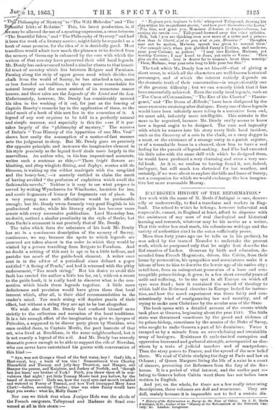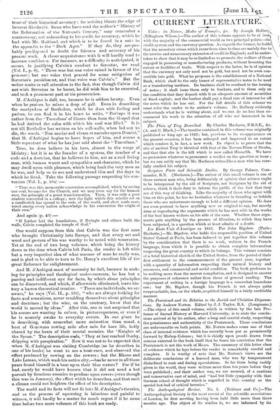D'AUBIGNE'S HISTORY OF THE REFORMATION.* ANY work with the name
of M. Merle d'Aubign6 is sure, deserv- edly or undeservedly, to find a translator and readers in Eng- land. The school to which he belongs, however influential and respectable, cannot, in England at least, afford to dispense with the assistance of any man of real theological and historical learning and research, whatever may be his merits as a writer.. That this writer has read much, his voluminous writings and the variety of authorities cited in the notes sufficiently prove.
More than forty years ago (as be tells us in his preface), he was asked by the learned Neander t3 undertake the present work, which lie postponed only that he might first describe the Reformation of Luther. Genevan by birth and education, de- scended from French Huguenots, driven, like Calvin, from their home by persecution, his sympathies and associations make it a labour of love to him to describe the heroic age of his native city ; to tell how, from an unimportant possession of a base and con-
temptible prince-bishop, it grew, in a few short eventful years of- strife and suffering, to be the spot in all Europe on which all eyes were fixed ; hew it contained the school of theology to
which half the Reformed churches in Europe looked for instruc- tion, and how the novel experiment was there fairly and con- scientiously tried of amalgamating law and morality, and of trying to make men Christians by the secular arm of the State.
The book opens with a detailed account of the events which took place at Geneva, beginning about the year 1513. The little
state was threatened sometimes by the greed and violence of its prince-bishop, sometimes by the armies of the Duke of Savoy, who sought to make Geneva a part of his dominions. Twice .t escaped as by a miracle from an overwhelming and irresistible army of besiegers. Resistance to ecclesiastical corruption and oppression increased and gathered strength, accompanied as else- where by a train of judicial murders and of martyrdoms.
Then the story passes to France, and the spread of the new belief" there. We read of Calvin studying theology at Paris and law at Orleans ; of Queen Margaret living the life of a saint in a court of sinners, protecting the Reformers from the fury of the Sor- bonne. It is a period of vital interest, and the earlier part re- lating to Geneva before Calvin went there has not before been written in English.
And yet, on the whole, for there are a few really interesting descriptions, these volumes are dull and wearisome. They are dull, mainly because it is impossible not to feel a certain dis-
• History of the Reformation in Burop•in the Time of Calvin. By J. H. Merle d'Aubigne, D.D., Author of the " History of the Reformation of the Sixteenth Cen• tury,'' de. London: Longman. trust of their historical accuracy ; for nothing blunts the edge of interest likedoubt. Some who have read the author's " History of the Reformation of the Sixteenth Century," may remember a controversy, not redounding to his credit for accuracy, which he had with Mr. Maitland, and which is to be found in a noto in the appendix to the " Dark Ages." If they do, they are pro- bably predisposed to doubt the fairness and accuracy of his present work. A closer acquaintance with it will hardly tend to increase confidetne. For instance, as a difficulty is anticipated, it seems, in justifying Calvin's conduct to Servetus, we read M. d'Aubigne is dull, too, because he is seldom hearty. Even when he praises, he mixes a drop of gall. Even in describing the martyrdom of Berthelier, which be does with feeling and pathos, he can find it in his heart to write, "Perhaps it was rather from the • Tusculans' of Cicero than from the Gospel that he had derived the calm with which his soul was filled." It is 410t till Berthelier has written on his cell-walls, when led out to die, the words, "Non moriar sed vivam et narrabo opera Domini," that M. d'Aubigne begins to have hopes of him, and seems a little repentant of what he has just said about the "Tusculans." True, he does believe in his hero, almost to the verge of idolatry ; but it is as the founder of a system, the teacher of a code and a doctrine, that he believes in him, not as a real living man, with human wants and sympathies and character, which be may dwell upon with pleasure, which bring back the very man as Ire was, and help us to see and understand him and the days in which he lived. Take the following passage respecting his con- 'version (Vol. 1., p. 53t) :- " Thus was this memorable conversion accomplished, which by saving one soul, became for the Church, and we may even say for the human race, the principle of a great transformation. Then, it was only a poor :student converted in a college ; now the light which this scholar set on a candlestick has spread to the ends of the world, and elect souls scat- tered among every nation acknowledge in his conversion the origin of their own." And again (p. 43) :— " If Luther laid the foundations, if Zwingle and others built the walls, Calvin completed the temple of God." One would suppose from this that Calvin was the first man who brought Christianity into Europe, and that every act and word and gesture of his was worthy to be noted with veneration. Yet at the end of two long volumes, which bring the history down to the time when Calvin left Paris, the reader is left with but a very imperfect idea of what manner of man he really was, and is glad to be able to turn to Dr. Henry's excellent life of the great Reformer for enlightenment. And M. d'Aubigne must of necessity be dull, because in seek- ing for principles and theological under-currents, lie has but a passing and indifferent eye for facts, by which alone principles can be discovered, and which, if afterwards eliminated, leave his- tory a barren theoretical treatise. " There are individuals, we are aware," he says (Vol. II., p. 532), " who are always looking for facts and sensations, never troubling themselves about principles and doctrines ; but the wise, on the contrary, know that the world is moved by ideas." After this, one is not surprised that his scenes are wanting in colour, in picturesqueness, or even if he is scarcely awake to everyday events. In one place he is describing, with somewhat more animation than usual, a boat of Genevans rowing mile after mile for bare life, hotly chased by the boats of their mortal enemies, the 'Knights of the Spoon." The description ends, "They at last reached Ouchy, dripping with perspiration." Now it was not to be expected that when M. d'Aubigne was visiting Cambridge (as he describes in one of his books) he went to see a boat-race, and observed the effect produced by rowing on the rowers ; but the Rhone and Lake Leman, which wash his native city,—has he never in all these years found himself in a boat upon their blue waters? For if he had, surely he would have known that it did not need a hot pursuit by ferocious enemies to produce upon rowers (even though this was in January), the effect which he describes, and that such a climax could not heighten the effect of his description. The world and its facts will not fit into M. d'Aubigne's theories, and as the process of squeezing is laborious and painful to witness, it will hardly be a matter for much regret if it be some time before two more volumes of this book are ready.































 Previous page
Previous page